When you see your parents and other people using credit cards, do you also have an idea how to get them? If you meet the minimum age requirement and are earning a steady income from a job, your dream of getting the best starter credit card will soon come true.
Many questions related to the best starter credit cards will definitely be in your mind, such as what are the credit cards available today, what will be the minimum eligibility criteria to get them, how to apply for them, how to check & build credit score after using the credit card.
Here we will discuss all these aspects. There are various types of credit cards running in the market and they fool their customers by lying about themselves or offering useless/non-beneficial features. That’s why we introduce you to 5 credit cards that will fulfill all your needs.
Benefits You Get from the Best Starter Credit Cards

If you are someone who is going to take the first step of your financial stage, then it would be a good decision for you to join Best Beginner Credit Card. A good introductory credit card is one that helps you set up your credit by reporting to the major credit agencies and also keeps a low rate of interest and fees.
It is not necessary that you get the same facilities together in all good credit cards, so overall your focus should be on a credit card, which gives you the maximum benefit and the loss is negligible.
5 Best Beginner Credit Cards
We have done an in-depth study of various beginner credit cards running in the market and in conclusion, we have come to know about such credit cards which will give you maximum benefits.
1. Discover it® Secured Credit Card
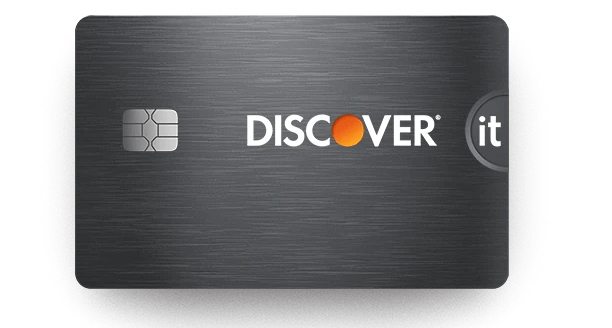
We have placed this at the top of the list of beginner credit cards because it is a very safe, compatible, and flexible option that offers great perks. With this lot of rewards, you can convert your secured card into a secured card within 7 months without any annual fee. Here, the purchase APR is 25.99% which is variable.
By looking at the cashback match in the first year, earn a huge amount when you get credit with the first credit card.
Pros:
- A simple way for registration
- Cashback rewards
- Cashback match at the end of the year
- Change secured credit card to unsecured
- Good low introductory APR
- Monthly access to FICO score for free
Cons:
- Requirement of deposit
- APR is high
- Bounded abroad approval
Additional Features:
It is a great secure credit card that absolutely gives cashback rewards and also offers some special rewards with that. Here’s the way it works:
- 2% cash back at restaurants and gas stations up to $1000 each quarter (combinedly).
- 1% cash back on all other limitless purchases.
- In the initial 12 months, cash back matches as a welcome bonus.
- No yearly charge.
- The credit score limit is 300-669.
2. The Prosper® Card
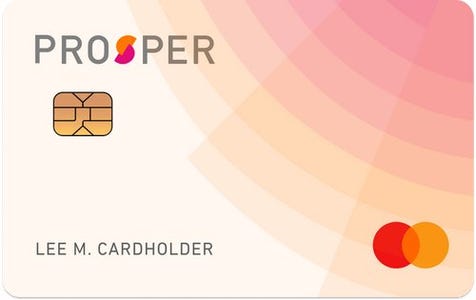
The best starter credit cards given to new borrowers are mostly secured and it means that there is a need to deposit funds in them. This case is also an exception for some people who do not feel like giving money first. So here we have told you about the best option which is the Prosper Card.
Prosper unsecured Credit Cards are good for you if you have bad credit or are one of the no-credit borrowers.
Pros:
- No deposit need
- No cash advance charges
- Quick application process
- Increment in credit limit after three months
- International transactions accessible
Cons:
- APR is high
- Annual charges are $39
- No any kind of rewards
- No introductory offers
- No balance transfer
Additional Features:
- Annual fee- $39 (for autopay it is $0 for the initial 12 months)
- Credit score- 300 to 669
- $500 to $3000 limit on credit
- Purchase APR 22.74% to 33.74%
3. First Progress Platinum Prestige Mastercard® Secured Credit Card
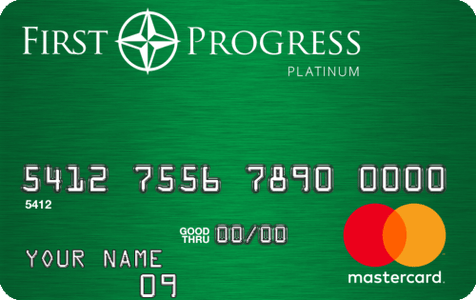
The First Progress Platinum Prestige Mastercard secured credit card is one of the best Starter Credit Cards for beginners that do not bother much in giving approval.
It also demands a first security deposit which will be given to you when you close your own account. In this way, you build your trust and without checking your credit history, they accept you as an applicant.
Pros:
- Low APR
- Reports to the credit bureaus
- No credit investigation is required
- Money back policy for security deposit
Cons:
- Security deposit required
- $49 fee annually
- Synovus bank account required
- Cannot be changed into an unsecured card
Additional Features:
- This Mastercard also reports to popular credit bureaus as they are very supportive of building your credit report as soon as possible.
- Lower APR as compared to the above credit cards.
- You can get a low rate of interest.
- Credit score- 300 to 669.
- Purchase APR is 13.74% which is variable.
4. Discover it® Student Cash Back
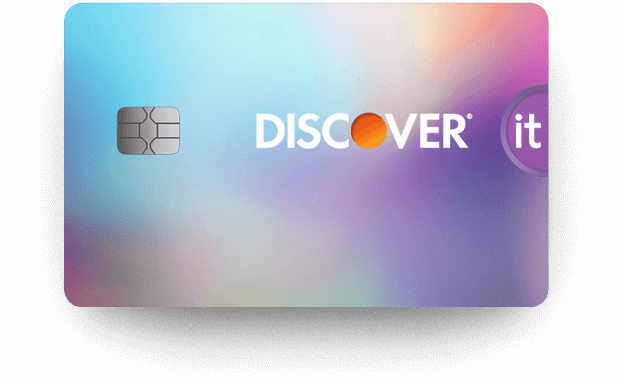
If you are a student and looking to get your first credit card, then Discover it Student Cash Back will be a great option for you. Even if you have no credit history at all, your application for a student card is likely to be accepted. The card has some great deals, like 0% APR on all purchases for the first six months as well as a one-to-one cashback match which will continue for the initial 12 months.
Pros:
- No yearly charges
- Cash back rewards
- Cash back match
- Zero % APR
- Welcome bonus
- Program for Good Grade rewards
Cons:
- Rewards in variations
- You should be a student
- Approval abroad is limited
- High APR
Additional Features:
- 5% cash back on gas and food.
- This card can be very helpful as you settle into a new school.
- 1% cash back on each purchase.
- A $20 statement credit is provided by Good Grade Reward for a 3.0 grade point average or more than 5 years from the time you opened your card.
- Keep using the card even after the advantages expire because it has good rewards management and no annual fee.
- Credit score: 580 to 739.
- Purchase APR is 15.99%-24.99% variable.
5. Petal® 2 Visa® Credit Card
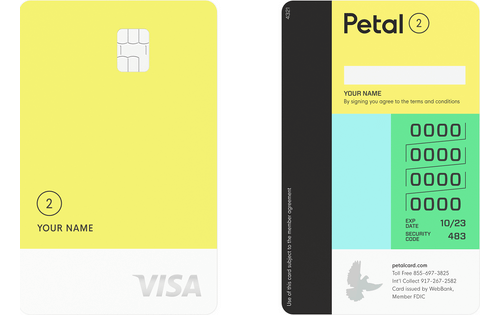
For new credit card holders, one of the least expensive borrowing options is the Petal® Visa. There is no fees name for not charging fees such as yearly fees, foreign transaction fees, and late fees.
Additionally, it is one of the few credit cards that does not require a Social Security Number, so new borrowers who are not basically from the United States may still be eligible.
The Petal® 2’s cashback rewards program, which allows you to earn cashback between 1% and 10% on per-day purchases, is the main benefit of the device.
Pros:
- No International transaction fees
- Reward rate: 1% to 1.5%
- Accessible to individuals with no credit
- No yearly fee
- No charges for late payoff
Cons:
- No transformation of the balance
- High APR
- No starter APR
Additional features:
- 15.99%–29.99% Purchase APR that is variable.
- 300-669 credit score
- Zero annual fee
- 1% to 1.25 percent cash back on all eligible purchases
- The Petal® 2 is unsecured, so it does not require a security deposit, unlike most of the cards on this list.
How Can I Get a Credit Card for the First Time?
If you have understood which credit card to choose, then now the process of getting the best starter credit card will not be so difficult if you follow the steps given by us carefully.
1. Eligibility Criteria
If you are an employee and have a steady source of income, then you will not have any problem getting your first credit card. You just need to fulfill these eligibility requirements:
- The minimum age should be 18 years.
- You must have a valid social security number.
- Issue some proof that the expenses are affordable for you.
Moreover, If you do not have a job now but you have enough savings or you get some money through any means, you will still be entitled to get the eligibility mentioned above.
If you are not able to get enough income and savings then in such a situation if you apply for a secured credit card then you will get a good opportunity for approval.
2. Credit Card Selection
Read the below points carefully and apply them while choosing your first credit card otherwise a wrong credit card can cost us a lot.
Don’t Apply Carelessly
When you apply for a credit card, it triggers a process of hard inquiry on your credit report, and your credit score will come down due to any deficiency. If this check continues like this through different applications, then your score will decrease so much that if you start applying for any credit card in the future, it will get rejected.
Therefore, you should not show carelessness in choosing the right credit card, choose only the one that you can get.
Exaggerated Terms
There are some credit cards for which you have to pay high interest rates and they also charge you unnecessary fees. So first check all the pros and cons of these cards carefully and the agreement offered by them so that you never have to face any loss later.
3. Way to Submit Application
The process of applying for most all credit cards is fairly simple and requires you to fill out either in-person or online. Most likely, you’ve received mail advertisements for beginner credit cards or were asked to create an account at a retailer when you checked out.
4. Complete All Essentials
As a starter card, a secured credit card requires a deposit and you have to pay it before you get it otherwise you might be rejected. An unsecured credit card will be mailed to you if your application is approved.
After that, you’ll need to call an automated number enter your pin number, and follow another informed process for the activation of your credit card.
5. Points to Consider for Reapplying If You are Rejected
The first thing you should do before applying for a new card is to understand the reason for the rejection of your application. In most cases, the card issuer will explain the reason behind the refusal-for example, you might have an insufficient credit history or a low credit score. After you figure out the reason, pick a different card that has a higher chance of being approved.
For instance, you can search for a credit provider that doesn’t check your credit.
Until you become a cardholder, you should apply once every 14 days. If you make sure you apply for the right cards, you should not require more than one application.
What Qualities Should a Starter Credit Card Have?
Before selecting the best starter credit card, you have to keep some important considerations in mind which we have mentioned below:
Reporting to Credit Bureaus:
As your credit provider reports to credit agencies— Equifax, Experian, and TransUnion, through these it enhances the credit background you are setting up with your credit card and assists you get approved for other best credit cards for the future.
Accessible Security Deposits:
You don’t need a lot of credit to apply for a secured credit card. As a result, you should search for a credit card that requires a small minimum security deposit.
With Low or No Processing, Yearly, or Other Fees:
Credit card charges are worthwhile if you receive perks and rewards that make up for the cost. Since starter cards don’t come with many benefits, paying fees is pointless.
Low APR:
Unfortunately, If you have a bad credit score or no credit at all, high annual percentage rates (APRs) on credit cards are not avoidable. To keep away from expensive rollovers that are attached to high-interest payments, you should therefore periodically pay off the required balance monthly.
How to Build Credit With Beginner Credit Cards?
Knowing how to improve your credit score is especially important if you are just getting started with credit cards. For this, select a credit card that reports to all three popular credit reporting bureaus and has few fees.
With these methods, you will be able to pay all your bills on time and also increase the number of benefits you’ll experience as a result.
Building credit isn’t a quick job, but making consistent payments pays off. Your score should begin to rise after a year of good account management.
Here’s How to properly manage your credit card and use it carefully:
1. Spend Less on Credit Cards
You shouldn’t use your credit card a lot, even though it can help you build your credit card. That might appear to be nonsensical, yet it’s the foundation of capable credit use. Instead of using your credit card as a license to spend beyond your means, you should think of it as a useful tool.
2. Don’t Pay Bills Late
It is of the utmost importance to pay all of your bills on time. Your credit can be damaged by even one overdue payment, likewise, a long history of late payments is extremely harmful. Your credit score suffers even more from non-payments such as debts that you simply do not pay off.
3. Avoid Maximizing Interest-based Debt
By itself, paying interest does not hurt your Best Starter Credit Card; However, if you are unable to repay your loans on time or in full, your credit score will suffer significantly.
Frequently Asked Questions (FAQs)
Q.1 How much to spend on a credit card as a beginner?
Your credit score is significantly influenced by your credit usage, or how much of your total credit limit are you using. Try to keep your limit to less than 30%.
For instance, if your credit card has a limit of $1,000. You shouldn’t spend over $300 every month on it (since $300 equals 30% of $1,000). So, limit your usage to only one digit whenever possible.
Q.2 What is the best beginner credit card to get?
If you’re new to credit cards, check all of these best beginner credit cards, and some of them offer great rewards.
- Capital One SavorOne Cash Back Credit Card for Students
- Discover it® Student Cash Rewards
- Discover it® Secured Credit Card
- Capital One QuicksilverOne Credit Card with Cash Backs
- Capital One VentureOne Credit Card with Rewards
- Capital One Platinum Credit Card
- Discover it® Student Credit Card
- Petal® 2 Cash Back Visa® Credit Card, No Fees
- Deserve® EDU Mastercard for Students
- Capital One®️ Spark®️ Classic Credit Card for Business
Q.3 What are the best starter credit cards that do not charge international fees?
Here is the list of best credit cards that don’t charge foreign transaction fees:
- Capital One Quicksilver Cash Rewards Credit Card
- Capital One Venture Rewards Credit Card
- Bank of America® Travel Rewards credit card
- Chase Sapphire Preferred® Card
- Wells Fargo Autograph℠ Card – Offer Ending Soon
- Capital One SavorOne Cash Rewards Credit Card
- Deserve® EDU Mastercard for Students
- Capital One QuicksilverOne Cash Rewards Credit Card
- Ink Business Preferred® Credit Card
Author Profile
- Elizabeth Jones is one of our editorial team’s leading authors on credit card offers, services & more. With over two decades of experience in the consumer credit industry and as a nationally recognized credit expert, Elizabeth provides in-depth analysis of both traditional & alternative forms of credit. Elizabeth regularly appears on many major media outlets including NBC Nightly News, Fox Business Network, CNBC & Yahoo! Finance. She is also a frequent contributor to Forbes Magazine. As a highly appreciated author for our exclusive Editorial Team, Elizabeth strives to provide readers with a trustworthy advice on how to manage their credit accounts while staying informed on the latest offers in the marketplace.
Latest entries
 BlogSeptember 26, 2023How to Block Payments on Cash App: A Comprehensive Guide
BlogSeptember 26, 2023How to Block Payments on Cash App: A Comprehensive Guide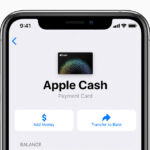 BlogSeptember 21, 2023How to Add Money to Apple Pay: A Comprehensive Guide
BlogSeptember 21, 2023How to Add Money to Apple Pay: A Comprehensive Guide BlogSeptember 20, 2023PayPal Gift Cards: Everything You Need to Know
BlogSeptember 20, 2023PayPal Gift Cards: Everything You Need to Know BlogSeptember 20, 2023How to Add an Apple Gift Card to Wallet: A Step-by-Step Guide
BlogSeptember 20, 2023How to Add an Apple Gift Card to Wallet: A Step-by-Step Guide

